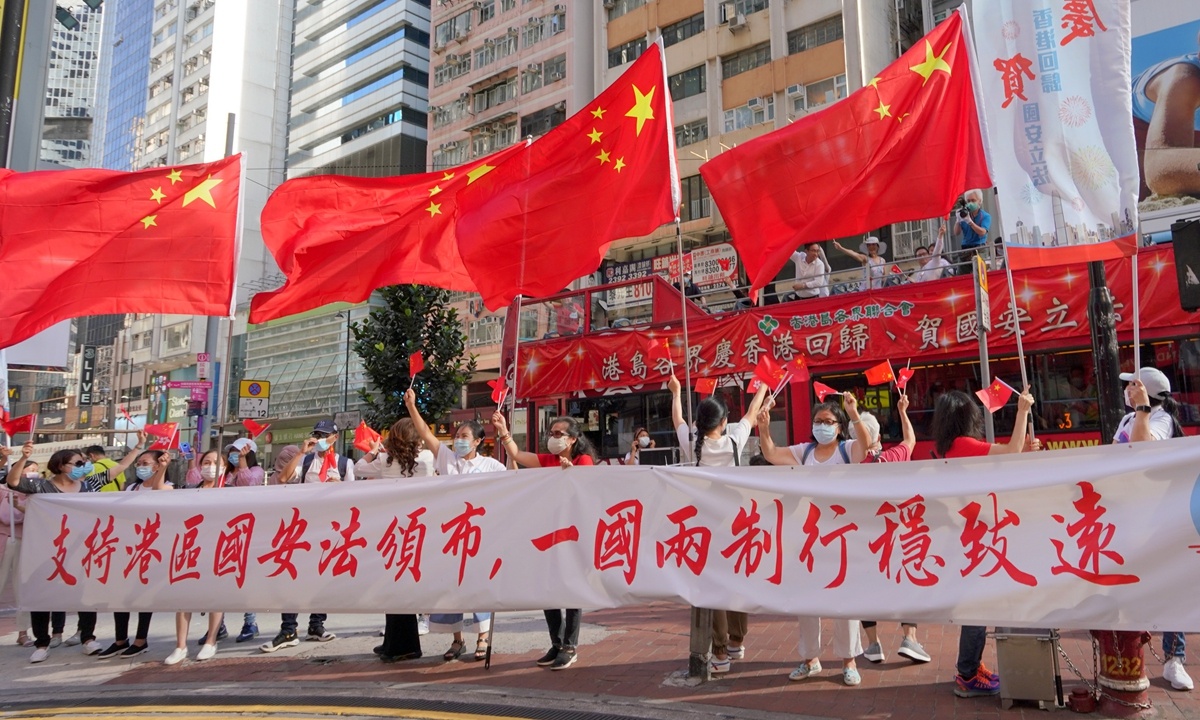
Hong Kong citizens on Tuesday gather to support the National Security Law for Hong Kong. (Photo: cnsphoto)
Representatives from more than 20 countries voiced support for China's enactment of the national security law for Hong Kong at the United Nations Human Rights Council (UNHRC) in Geneva on Wednesday and Thursday, following a joint statement that Cuba made on Tuesday on behalf of 53 countries to endorse the passage of the law.
Russia's representative said Russia firmly supports China in implementing the "one country, two systems" principle in the Hong Kong Special Administrative Region (HKSAR) and that Hong Kong affairs are entirely China's internal affairs.
Laos' representative said Laos welcomes China's effort to safeguard national security through the establishment and improvement of the legal system and enforcement mechanism for the HKSAR. Representatives from Myanmar and Cambodia stated the legislative power for national security falls under the sovereignty of one country, and China's national security law for Hong Kong is conducive to safeguarding national security and maintaining the "one country, two systems" principle. They hope the HKSAR can maintain peace, stability and prosperity without interference from foreign countries.
The representative from Afghanistan stressed that the law will not undermine the "one country, two systems" principle and the legitimate rights, freedoms and interests of Hong Kong residents. Cabo Verde's representative said China's national security law for the HKSAR comes under China's sovereignty and it has nothing to do with human rights issues.
Burundi said it welcomes China's efforts to promote and protect human rights and its contributions to the international human rights cause. The representative said the law will protect the human rights of Hong Kong residents, noting that both the HKSAR and the Xinjiang Uygur Autonomous Region are integral parts of China. Burundi urged relevant countries to immediately cease acts that are in violation of the Charter of the United Nations, which include using Hong Kong and Xinjiang affairs and human rights issues to interfere in China's internal affairs.
North Korea, Venezuela and Cameroon said they resolutely opposed relevant countries use of Hong Kong and Xinjiang affairs to interfere in China's internal affairs.
Serbia, Armenia and Chad expressed their adherence to the one-China principle, support for China's efforts to safeguard its sovereignty and territorial integrity, and the "one country, two systems" principle.
Nepal and Kyrgyzstan also stressed that Hong Kong affairs are China's internal affairs. Tanzania emphasized that both Hong Kong and Taiwan are integral parts of China and said it opposes the politicization of human rights issues.
The Maldives said that China is one of its important cooperative partners and the development of bilateral relations has always been based on the principle of mutual respect for sovereignty and territorial integrity. Under the "one country, two systems" principle, Hong Kong residents will enjoy stability, prosperity and freedom.
Ethiopia, Cote d'Ivoire and Madagascar said Hong Kong affairs were China's internal affairs. They said the UNHRC should abide by the principles of objectivity, impartiality, constructiveness, non-politicization and non-selectivity, and it should refrain from politicizing human rights issues or adopting double standards.
Indonesia, Vietnam, Bahrain, Sudan, Algeria, Nigeria and Morocco said that all countries should abide by the basic norms governing international relations, including non-interference in other countries' internal affairs, and said they oppose interference in other countries' internal affairs using the excuse of human rights issues.


